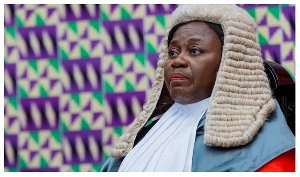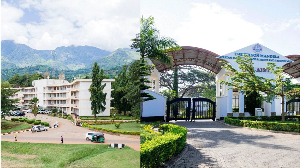In general terms, justice means upholding what is right and punishing what is wrong. This means that, whenever a crime is committed, justice must be done. Dr. Glanville Williams expressed the view that “a crime is a legal wrong that can be followed by criminal proceedings which may result in punishment". Section 1 of the Ghanaian Criminal Code, 1960, Act 29, defines crime as "any act punishable by death or imprisonment or fine". Besides, Article 19(21) of the 1992 Constitution states that a crime is: “a criminal offence under the laws of Ghana".
A crime by its nature is so injurious that the redress must not be left to any individual but must be taken up by the state (acting as the nominal plaintiff). Therefore, whenever there is a commission of an offence, there is also a sanction (punishment) which is imposed by the state unto the accused. The end of punishment in this case is aimed at reforming the criminal to make him a better person after serving the sentence. The essence of the reformative theory is in fact, that there is every hope that the type of punishment given to the criminal has a chance of changing him into a useful citizen. The court (state) in punishing the accused p e r on (herein guilty) has any of the following aims:
a) punishment as a deterrent. Deterrent is aimed at two groups of people: I. the accused person himself and;
Ii.the members of the general public who have witnessed what have happened to the accused person are warned to desist from such acts.
It is worthy to note that, even before the final sentence is meted, the court (state) by way of allocutus demands from the offender whether he has a cause to show why judgment should not be pronounced against him- as a way of ensuring justice.
From the foregoing, to ensure justice, the state makes all conscious efforts to punish the wrong (the accused). The legitimate question therefore is; HOW DOES THE STATE also uphold what is right? After punishing the wrong with the aim of making him a better person, WHAT PACKAGE IS THERE FOR THE PEACE-LOVING AND LAW-ABINDING CITIZEN WHO MIGHT HAVE SUFFERED AS A RESULT OF THE WRONGFUL ACT OF THE ACCUSED? A critical look into the Criminal Justice System of Ghana will reveal that, more emphasis is placed on the perpetrators of crimes rather than the victim who is a law-abiding citizen. He is neglected after sentencing the accused without taken steps to restore him to his formal position before he suffered from the harm inflicted upon him or steps to mitigate the pain and loss suffered.
Article 3 clauses (5) and (7) of the 1992 Constitution state in extenso: “(5) Any person or group of persons who suppresses or resists the suspension, overthrow or abrogation of the constitution as referred to in clause (3) of this article, c o m m i t s no offence;
(7) The Supreme Court shall, on application by or on behalf of a person who has suffered any punishment or loss to which clause (6) of this article relates, award him adequate compensation, which shall be charged on the Consolidated Fund, in respect of any suffering or loss incurred as a result of the punishment ".
Besides, according to Article 14 clause (5),
“A person who is unlawfully arrested, restricted or detained by any other person shall be entitled to compensation from that other person ".
Some potent questions to be asked are that: i). From Article 3, does it mean that, a person is not considered to be a victim if he suffered no punishment or loss to which clause (6) of that article relates?
ii). From Article 14, does it mean that there shall be no compensation whatsoever if the “other person" is not known or found?
If the answers to the above questions are in the negative, what package has G h a n a as a nation made available for victims of all sort of crimes?
According to the United Nations 'Declaration of Basic Principles of Justice for Victims of Crime and Abuse of Power (Adopted by General Assembly resolution 40/34 of 29 November, 1985) "victims" means persons who individually or collectively, have suffered harm, including physical or mental injury, emotional suffering, economic loss or substantial impairment of their fundamental rights, through acts or omissions that are in violation of criminal laws operative within member states, including those laws proscribing criminal abuse of power”. It continues that,
“A person may be considered a victim, under this Declaration, regardless of whether the perpetrator is identified, apprehended, prosecuted or convicted and regardless of the familial relationship between the perpetrator and the victim. The term "victim' also includes where appropriate, the immediate family or dependants of the direct victim and persons who have suffered harm in intervening to assist victims in distress or to prevent victimization".
According to the ‘Declaration’:
a. Victims should be treated with compassion and respect for their dignity. They are entitle to access to the mechanisms of justice and prompt redress, as provided for by the national legislation, for the harm that they have suffered
b. When compensation is not fully available from the offender or other sources, states should endeavour to provide financial compensation to:
i. Victims who have sustained significant boldly injury or impairment of physical or mental health as a result of serious crimes;
ii. The family, in particular dependants of persons who have died or become physically or mentally incapacitated as a result of such victimization.
c. The establishment, strengthening and expansion of national funds for compensation to victims should be encouraged. Where appropriate, other funds may also be established for this purpose, including in those cases where the state of which the victim is a national is not in a position to compensate the victim for the harm.
d. Victims should receive the necessary material, medical, psychological and social assistance through governmental, voluntary, community-based and indigenous means.
e. Police, justice, health, social service and other personnel concerned should receive training to sensitize them to the needs of victims, and guidelines to ensure proper and prompt aid.
Before and after the above 'Declarations' and others, several countries have made it as a policy to ensure the well-being of victims to make criminal justice system a whole. These countries include United Kingdom (England, South Wales, North Ireland and Canada), United States of America (New York, Hawaii and so forth) and South Africa. Some of the above declarations have been wholly adopted and modified in accordance with critical consideration of their national aspirations.
Article 33(5) of the 1992 Constitution of Ghana states in extenso: “The rights, duties, declarations and guarantees relating to the fundamental human rights and freedoms specifically mentioned in this chapter shall not be regarded as excluding others not specifically mentioned which are considered to be inherent in a democracy and intended to secure the freedom and dignity of man".
If Ghana as a nation has incorporated this pious provision in her 1992 Constitution which per Article 1( 2), "....shall be the supreme law of Ghana...." then, it is a high time, Ghana as a nation adopted a national policy for the welfare of "victims of crimes" if the above article is to be adhered to. As was aptly pointed out by one learned judge, Justice Oputa that: JUSTICE IS NOT A ONE-WAY TRAFFIC BUT A THREE-WAY ONE;
comprising the state, the accused and the victim.















